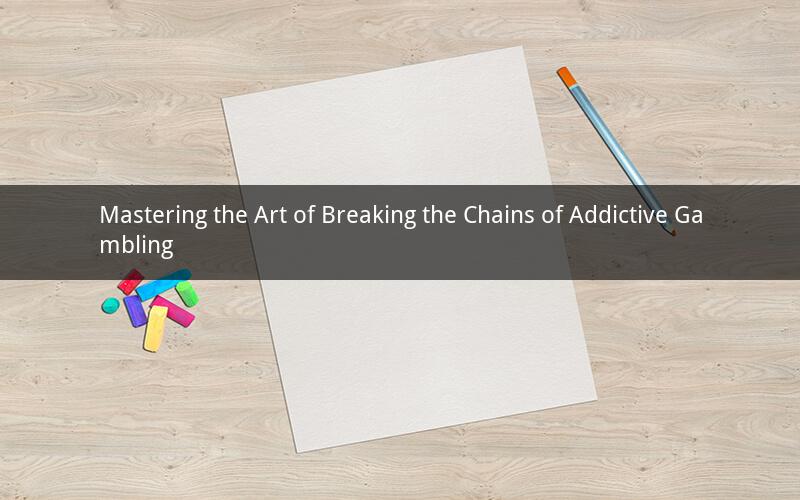
In a world where entertainment is just a click away, the allure of gambling has become increasingly tempting. For many, it starts as a form of entertainment, but for some, it can spiral into an uncontrollable addiction. Understanding how to stop addictive gambling is crucial for those seeking to reclaim their lives. This article delves into the complexities of addictive gambling, offering insights and practical strategies to help break the cycle.
1. Understanding Addictive Gambling
Addictive gambling, often referred to as problem gambling or gambling disorder, is characterized by an inability to control gambling behavior, leading to significant negative consequences in various aspects of life. It's important to recognize the signs of addictive gambling to take the first steps towards recovery.
1.1 The Signs of Addictive Gambling
- Compulsive Need to Gamble: The urge to gamble becomes overwhelming, often at the expense of other responsibilities.
- Lying to Cover Up: Individuals with addictive gambling might lie about their activities or hide their debts.
- Gambling to Escape: Many turn to gambling as a way to cope with stress or other emotional issues.
- Neglecting Responsibilities: Personal, professional, and social responsibilities are neglected as a result of gambling.
- Financial Struggles: Significant financial losses occur, often leading to debt and financial instability.
2. Strategies to Stop Addictive Gambling
Breaking free from addictive gambling requires a multi-faceted approach, including self-awareness, seeking support, and implementing practical strategies.
2.1 Building Self-Awareness
The first step in overcoming addictive gambling is to recognize and accept the problem. This involves:
- Reflection: Take time to reflect on the negative impact gambling has had on your life.
- Journaling: Keep a diary of your gambling activities, noting the triggers, emotions, and consequences.
- Educate Yourself: Learn about the psychology behind addictive gambling and its effects on the brain.
2.2 Seeking Professional Help
Professional help can provide the necessary tools and support for recovery. This includes:
- Therapy: Cognitive-behavioral therapy (CBT) and other therapeutic approaches can help change negative thought patterns and behaviors.
- Support Groups: Joining a support group, such as Gamblers Anonymous, can offer a sense of community and shared experiences.
2.3 Implementing Practical Strategies
To maintain sobriety, it's essential to implement practical strategies:
- Set Clear Limits: Establish strict gambling limits and stick to them.
- Create a Support System: Surround yourself with supportive friends and family who understand your situation.
- Replace Bad Habits with Good Ones: Engage in healthy activities that can distract you from the urge to gamble.
- Financial Management: Develop a budget and seek financial counseling if needed.
3. The Role of Technology in Overcoming Addictive Gambling
Technology plays a significant role in both facilitating and combating addictive gambling. Here's how you can use technology to your advantage:
- Use Blockers: Install software that blocks access to gambling websites and apps.
- Monitor Usage: Keep track of your online activities to identify patterns and triggers.
- Educational Resources: Utilize online resources and apps designed to help with addiction recovery.
4. The Importance of Persistence and Patience
Breaking free from addictive gambling is a long-term process that requires persistence and patience. Here are some key points to remember:
- Relapse is Normal: Understand that relapse is a part of the recovery process and does not define your worth or future success.
- Celebrate Small Wins: Acknowledge and celebrate the small victories along the way.
- Stay Committed: Maintain your commitment to recovery, even during challenging times.
5. Frequently Asked Questions about Stopping Addictive Gambling
Q1: How long does it take to overcome addictive gambling?
A1: The timeline for overcoming addictive gambling varies from person to person, but recovery is possible. With dedication and professional help, many individuals see significant improvements within a few months to a year.
Q2: Can addictive gambling be cured?
A2: While there is no one-size-fits-all solution, addictive gambling can be managed and controlled. Recovery is a lifelong journey, and many individuals lead fulfilling lives free from the grips of addiction.
Q3: What if I can't afford professional help?
A3: There are many free or low-cost resources available for individuals struggling with addictive gambling. Reach out to local support groups, online communities, and government programs that offer assistance.
Q4: Can my family and friends help me stop gambling?
A4: Absolutely. Your loved ones can provide emotional support, encouragement, and practical assistance throughout your recovery journey.
Q5: How can I avoid relapse?
A5: Avoiding relapse involves staying vigilant, practicing self-care, and maintaining a strong support system. Stay connected with your therapist or support group, and be prepared to address triggers and cravings when they arise.
In conclusion, overcoming addictive gambling is a challenging but achievable goal. By understanding the problem, seeking help, and implementing practical strategies, individuals can reclaim their lives and move towards a healthier, more balanced existence. Remember, recovery is a journey, and it's never too late to start.